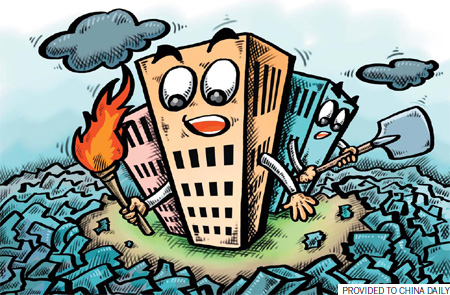Burn the garbage, not the available land
Updated: 2011-05-06 12:00
By Nie Yongfeng (China Daily European Weekly)
|
 |
Families in Beijing create around 18,000 tons of solid waste every day. In 2009, they generated 6.7 million tons of garbage. The amount of garbage in the city is growing at a clip of 8 percent every year.
About 90 percent of household garbage in Beijing goes to landfills, which takes up 33 hectares of land a year. All of Beijing's landfills will fill up to capacity in four years at the current pace.
The crisis over what to do with the piles of garbage is not only happening in Beijing but also in many other cities in China, where available land for garbage is scarce.
Garbage incineration plants are an inevitable choice in large cities in China where the pressure to find enough space for landfills is high. In cities such as Beijing, Shanghai and Guangzhou, there is no way these cities can continue to use landfills as the main solution.
In China, around 85 to 88 percent of household waste is buried. Ten percent of garbage goes into incineration plants with 2 percent ending up in compost plants.
Using precious land to bury garbage is unwise. Landfills have a higher risk of damaging the environment over the long run as compared to incineration plants, which will play an increasingly important role in waste management in China.
Around 60 percent of household garbage in China is biodegradable kitchen waste, which contains a lot of harmful leachate. The longer garbage is buried, the more chances that leachate will contaminate underground water if it is not properly handled.
An effective garbage management system should first sort through the garbage. Incineration plants or compost plants must then be used to treat the garbage. Leftovers (no pun intended) should then be buried in landfills.
The practice of incinerating garbage has a 100-year history in the West. It is an appropriate method of treating garbage, especially when you consider China's rapid urbanization, which entails a growing population trying to fill up less and less available land.
We should not overlook China's early problems with garbage incineration. The burning created toxic dioxin, but that was the result of an inferior incineration technology from the 1980s.
Incineration plants built in Europe after the 1990s are mostly based on sound technology and a safe emission management system.
China is not the only nation that has had problems with incinerating garbage. Around 1,000 incineration plants were shut down in Japan in the 1990s, but they were small and old incinerators that did not meet safe emission standards. They were replaced by larger incineration plants after the shutdown. The capacity of garbage incineration plants has increased in Japan over the past several years.
Modern incineration plants are able to control the emission of dioxin within the European Union's standards.
Since China has already adopted the best available air pollution control technologies, dioxin should not be an issue in the country given a proper supervision system.
Every garbage treatment method has shortcomings. Incineration is neither the only option nor the best choice. But it is the most suitable one in China for now.
If China decides to incinerate more of its garbage, it could save 90 percent of available land and reduce greenhouse emissions. After burning, it can also produce heat and power, transforming garbage into new energy.
China is now the world's second largest consumer of energy and third largest importer of oil. With the high demand for energy during this current economic expansion, incineration plants could lift the pressure off of the nation's garbage and energy crisis.
The author is a professor at the department of environmental science and engineering at Tsinghua University.
E-paper

Pearl paradise
Dreams of a 'crazy' man turned out to be a real pearler for city
Literary beacon
Venice of china
Up to the mark
Specials

Power of profit
Western companies can learn from management practices of firms in emerging economies

Foreign-friendly skies
About a year ago, 48-year-old Roy Weinberg gave up his job with US Airways, moved to Shanghai and became a captain for China's Spring Airlines.

Plows, tough guys and real men
在这个时代,怎样才"够男人"? On the character "Man"
